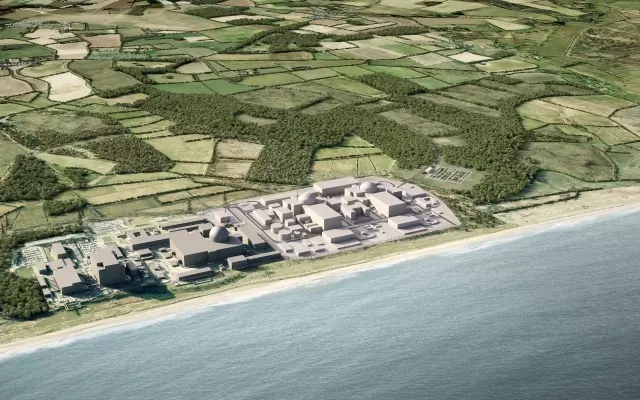The Sunak administration today presented early gifts to investors in nuclear power and advanced hydrogen, finding parcels of £77 million and £25 million respectively at the foot of Downing Street’s Christmas tree.
Readying new household boilers for conversion to burn clean hydrogen as early as 2026 in place of natural gas is a major target.
Naughty, nice or nuke?
The nuclear package breaks down to £60 million supporting next steps in developing the new cutting-edge High Temperature Gas Reactor (HTGR), a type of Advanced Modular Reactor (AMR) which Whitehall reckons could be up and running soon after 2030.
Funding from the Advanced Modular Reactor R&D programme seeks a working prototype to be in in operation by the end of this decade.
HTGRs are typically smaller, cheaper and more flexible than conventional nuclear power stations, such as EDF’s overdue, £26 Billion Hinkley C, or Sizewell C in Suffolk, – pictured – approved by D-BEIS two weeks ago with £679 million of public sweeteners.
Working temperatures of 950 degrees could also position HTGRs as a source of clean heat to decarbonise industrial processes. The HTR’s ability to contribute low-carbon electricity to make low-carbon, “pink”, nuclear-inflected hydrogen is also coveted.
Westinghouse, isotope fabricators working at the Springfields site in Preston, Lancs, receive today a promise of £13 million to refine the correct grades of fuel for Britain’s fleet of advanced gas cooled reactors.
Extending Westinghouse’s capabilities with both reprocessed uranium and its freshly mined cousin could cut imports, while protecting hundreds of highly skilled jobs. Export revenues are anticipated.
Besides bounty from the AMR Research, Development and Demonstration programme, a further £4m from the related AMR Knowledge Capture Project will facilitate knowledge capture and sharing, in quest of shorter delivery times for the programme.
Hydrogen, ho, silver lining
H2BECCS is seen as a unique ‘negative emission’ technology, capable of can removing waste CO2 from the atmosphere by absorbing CO2 into the growth of sustainable biomass and other organic materials.
Higher efficiency standards for new gas boilers are also announced in the package. Improving the devices’ efficiency will cut carbon emissions, before natural-gas-only boilers are phased out by 2035. The proposal estimates 21 million tonnes of CO2 can be saved by 2050, a sum equivalent to a year’s emissions from 9 million cars.
The government will also invite views on its desire that all new household gas boilers sold from 2026 can burn hydrogen, in preparation for a national switch.
Early industry response to Whitehall’s aspirations was favourable. For the Association for Renewable Energy and Clean Technology, Dr Nina Skorupska said:
“The REA is pleased to see continued Government progress on hydrogen policy, and feel these publications underline their commitment to the low carbon hydrogen sector.
“The REA also acknowledges the proposals for hydrogen-ready domestic boilers to become the standard by 2026. This will give consumers more options in their decarbonisation journey. However, we must ensure that such boilers do not prolong the life of natural gas in the UK”
Jane Toogood, appointed by the Johnson administration to be Britain’s Hydrogen Champion, opined:
“It’s good to see the next stage of implementation of the Hydrogen Strategy, particularly the consultation on the proposal to make new gas boilers hydrogen-ready.
“To maintain market confidence and investment, industry needs the Government to keep up the momentum, particularly on decisions to create demand for hydrogen and progress the hydrogen business models.”




